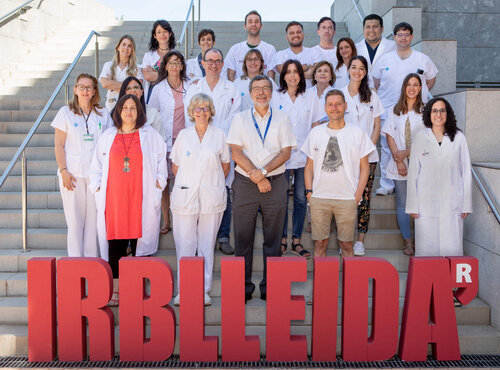A therapeutic target for the treatment of endometrial cancer with mutations in the ARID1A gene has been identified
Research led by the Oncological Pathology group at IRBLleida, the UdL and the Department of Pathological Anatomy at HUAV
Research led by the Oncological Pathology research group at the Institute for Research in Biomedicine of Lleida (IRBLleida), the University of Lleida (UdL) and the Department of Pathological Anatomy of the Arnau de Vilanova University Hospital of Lleida (HUAV) has identified a potential therapeutic target for the treatment of endometrial cancer in advanced stages with mutations in the ARID1A gene. Specifically, the research, published in the journal Molecular Oncology, has identified that the over-expression of the HDAC6 protein observed in this type of cancer gives tumour cells greater aggressiveness but also greater sensitivity to certain drugs. This last characteristic will allow personalised, second-line treatments (treatment that is carried out after the initial treatment, because it has not worked properly or the side effects are not tolerated) to be made more effective for these patients.
Endometrial cancer is one of the most common gynaecological cancers and represents the sixth most common type of cancer in women in industrialised countries. This type of cancer affects the endometrium (the layer of cells that lines the inside of the uterus) in women who are usually in, or have entered, the menopause. It is not the most deadly cancer, nor is it the most feared, as one of the initial tell-tale signs is the non-menstrual vaginal bleeding it produces, which usually prompts a quick consultation with a gynaecologist. Usually, when detected in the early stages, this type of cancer is curable. Unfortunately, however, between 15-20% of endometrial cancers are diagnosed in advanced stages of the disease, when the tumour cells open up into the tissue that contacts the endometrium, invade it and metastasise to the abdominal cavity. In these cases, unfortunately, the prognosis for the patient is not so favourable.
The Oncological Pathology research group at IRBLleida has detected that in this invasion process a high percentage of endometrial cancers present mutations in the ARID1A gene, a fact that makes the tumour cells more aggressive and therefore gives patients a worse prognosis. In addition, the researchers have identified that this greater aggressiveness is due to the fact that these tumours express a greater amount of the HDAC6 protein. Likewise, the research has proven that treatments against the HDAC6 protein are more effective in these types of tumours that present mutations in the ARID1A gene. The research was carried out using in vitro tumour models (with cells in a laboratory), in vivo models (murine models) and patient samples.
"These findings highlight the importance of ARID1A in the dissemination of tumour cells in the case of endometrial cancer and, therefore, may contribute to determining the attitude and treatment to be followed in patients with endometrial carcinoma in advanced stages and who present mutations in this gene," explained Cristina Megino Luque, a researcher in training and first author of the study. "Furthermore, the idea is that all this knowledge can contribute to generating new tools for blocking the invasion and metastasis process in endometrial cancer, but also for other types of tumours," added Nuria Eritja Sánchez, principal investigator of the Oncological Pathology group at IRBLleida and lecturer at the UdL.
The research has also involved the collaboration of researchers from the Molecular Mechanisms and Experimental Therapy in Oncology group at the Bellvitge Biomedical Research Institute (IDIBELL) and staff from the Biomedical Research Centre in Cancer Network (CIBERONC) of the Carlos III Institute of Health.
This research, led by Nuria Eritja, principal investigator of the Oncological Pathology group at IRBLleida and professor at the UdL, and Xavier Matias-Guiu, head of the Pathology Department at HUAV, principal investigator of the Oncological Pathology group at IRBLleida and professor at the UdL, has been made possible thanks to the Institute of Health of the Bellvitge Biomedical Research Institute (IDIBELL), has been possible thanks to the Instituto de Salud Carlos III (ISCIII) and the Centro de Investigación Biomédica en Cáncer en Red (CIBERONC) through the projects PI20/00502, CP19/00025 and CB16/12/00231 (co-financed by the European Regional Development Fund (ERDF) "A way of doing Europe" and ESF "Investing in your future").
Megino-Luque C, Sisó P, Mota-Martorell N, Navaridas R, de la Rosa I, Urdanibia I, Albertí-Valls M, Santacana M, Pinyol M, Bonifaci N, Macià A, Llobet-Navas D, Gatius S, Matias-Guiu X, Eritja N. ARID1A-deficient cells require HDAC6 for progression of endometrial carcinoma. Mol Oncol. 2022 Feb 15. doi: 10.1002/1878-0261.13193. Epub ahead of print. PMID: 35167193.

The Oncological Pathology research group






